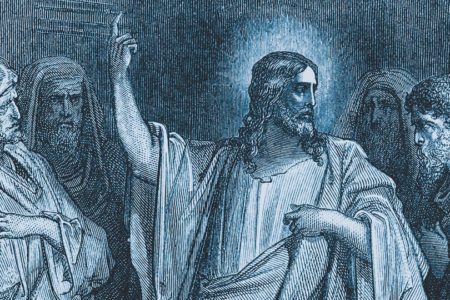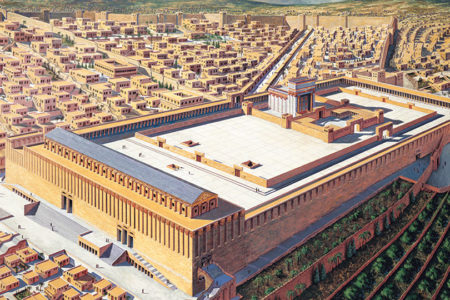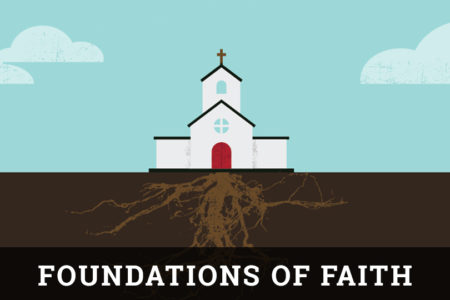The Hypostatic Union of Jesus Christ
The Meaning of the Term Hypostatic Union as Applied to Christ
The English word hypostasis is derived from a Greek word meaning “essence, actual being, reality” (William F. Arndt and F. Wilbur Gingrich, A Greek-English Lexicon of the New Testament, p. 854). Thus, it refers to the real essence of a person or thing. As applied to Christ, it is related to the issue of the real essence of the incarnated Jesus Christ.
In earlier articles, we saw that He is both deity and humanity in essence. The incarnated Jesus Christ has a complete divine nature and a complete human nature inseparably united in one person. Thus, He is a theanthropic person, a God-Man. The word theanthropic is derived from the combination of two Greek words: theos (God) and anthropos (man). This union of two complete natures in Jesus Christ has been called “the hypostatic union” by theologians because it is the real essence of the incarnated Christ.
The Meaning of the Term Nature
The term nature, when used in expressions such as divine nature and human nature, refers to a unique combination of attributes that determines the kind of a being or thing. A divine nature is a unique combination of attributes that makes a being divine instead of an angel, an animal, a plant, or a human being. A human nature is a unique combination of attributes that makes a being a human being instead of an angel, an animal, a plant, or a divine being.
Because a nature determines the kind of being, the union of a complete divine nature and a complete human nature in the incarnated Christ makes Him a God-Man. No other being possessed the union of these two natures prior to the incarnation of Christ, and no other being will possess it in the future. This means that the incarnated Jesus Christ is the only God-Man and, therefore, is a unique being.
The Biblical Revelation of Christ’s Hypostatic Union
At least two Old Testament passages foretold that the Messiah would be a God-Man, with deity and humanity united in the same person.
Isaiah 9:6–7: By revelation of God, the Prophet Isaiah presented several names that would apply to the Messiah. According to Edward J. Young, those names “are accurate descriptions and designations of His being. In the Bible the name indicates the character, essence or nature of a person or object” (The Book of Isaiah, vol. I, p. 331). In an earlier article, we saw that two of those names (“Mighty God” [el gibbor] and “Everlasting Father”) ascribed deity to the Messiah.
In addition, Isaiah declared that the Messiah would be a child born. Because deity is not born but humanity is, this declaration indicated that the Messiah would also be a human being.
Thus, according to Isaiah’s prophecy, the Messiah would possess the union of deity and humanity. In light of this, Young wrote concerning Isaiah: “By means of the words yeled, ‘child,’ and yullad, ‘is born,’ he has called attention to the Messiah’s humanity, but by the phrase ‘el gibbor’ we are brought face to face with Messiah’s deity” (Ibid., p. 337). In essence, Isaiah foretold that the Messiah would be a God-Man and, therefore, a unique being.
The Messiah’s uniqueness was emphasized by another name that Isaiah indicated would apply to the Messiah—the name “Wonderful” (lit., “Wonder” in the Hebrew text). Concerning the name “Wonder,” Young stated, “In reality this is stronger than if he had used an adjective. Not merely is the Messiah wonderful but He is Himself a Wonder, through and through” (Ibid., p. 334). Indeed, the fact that the Messiah would possess a union of complete deity and complete humanity as His real essence would make Him a Wonder. What mere human being can fully comprehend the uniqueness of this person?
Daniel 7:13: In this part of a revelational vision that God gave to the Prophet Daniel, the Messiah was portrayed as being “like the Son of man” (lit., “like a son of man” in the Aramaic text) and coming “with the clouds of heaven.” The expression “a son of man” indicated that the Messiah would be human, an offspring of mankind, but the word “like” implied that He would be more than just human. Several Old Testament passages signified that the clouds are the chariot of God (Ps. 104:3; Isa. 19:1). Thus, the fact that this divinely revealed vision portrayed the Messiah as coming “with the clouds of heaven” indicated that He would also be deity. Daniel was seeing a person who would be deity incarnated in humanity.
Gleason L. Archer, Jr. wrote concerning this prophetic portrayal of the Messiah:
The personage who now appears before God in the form of a human being is of heavenly origin. He has come to this place of coronation accompanied by the clouds of heaven and is clearly no mere human being in essence. The expression “like a son of man” (kebar ‘enas) identifies the appearance of this final Ruler of the world not only as a man, in contrast to the beasts (the four world empires), but also as the heavenly Sovereign incarnate (Daniel, vol. 7, The Expositor’s Bible Commentary, p. 90).
At least three New Testament passages signified that Jesus Christ fulfilled the Isaiah 9:6–7 and Daniel 7:13 prophecies foretelling that the Messiah would be a God-Man.
John 1:1, 14: When referring to Jesus Christ as “the Word,” the Apostle John wrote, “and the Word was God” (Jn. 1:1). He did not write, “and the Word was the God,” because that would mean that the Word was God the Father. John wrote the word “God” without “the” for a purpose. He wanted to signify that although Jesus as the Word was a distinct person from God the Father, He was of the same divine essence or nature as God (H. E. Dana and Julius R. Mantey, A Manual Grammar of the Greek New Testament, pp. 139–140).
After presenting the deity of Jesus Christ in verse 1, the Apostle John declared, “And the Word was made flesh, and dwelt among us” (Jn. 1:14). The word translated “was made” indicates entrance into a new condition, the act of becoming something that a person was not before (Arndt and Gingrich, A Greek-English Lexicon of the New Testament, p. 158). The word “flesh” refers to “a human being in contrast to God and other supernatural beings” (Ibid., p. 751). Thus, John was saying that through incarnation the divine Christ became something that He was not before—He became a human being.
The verb translated “dwelt” means “tabernacled” (Wilhelm Michaelis, “skenoo,” Theological Dictionary of the New Testament, vol. VII, p. 386). Just as eternal deity tabernacled in a tent among the Israelites in Old Testament times, so the incarnate Jesus Christ was eternal deity tabernacling in human flesh among human beings for more than thirty years (Ibid.).
Romans 1:3–4: In Romans 1:3, the Apostle Paul referred to God’s “Son, Jesus Christ our Lord,” and in verse 4 he called Jesus “the Son of God.” In the Old Testament and writings of post-biblical Judaism, the Hebrew words for “son” were “often used to denote the relationship which determines the nature of a man” (Eduard Lohse, “huios,” Theological Dictionary of the New Testament, vol. VIII, p. 358). Thus, by applying the title “the Son of God” to Jesus Christ, the Apostle Paul signified that He had the same divine nature as God the Father.
Paul further stated that God’s Son “was made of the seed of David according to the flesh” (v. 3). God’s Son became a physical, human descendant of King David. Concerning the expression “according to the flesh,” John Murray wrote, “In the usage of the New Testament, when applied to Christ, the denotation cannot be other than human nature in its entirety” (The Epistle to the Romans in The New International Commentary on the New Testament, p. 8). Thus, Paul’s statement indicated that Jesus Christ was God’s divine Son who assumed complete humanity and thereby became a God-Man.
Galatians 4:4: The Apostle Paul wrote, “But, when the fullness of the time was come, God sent forth his Son, made of a woman.” The opening part of this statement signifies that Paul was referring to an event that took place at a point of time in history. That event was God’s sending forth His Son from heaven to earth. The words “sent forth” imply that the Son already existed in heaven before He was sent (J. B. Lightfoot, The Epistle of St. Paul to the Galatians, p. 168). The designation “his Son” signifies that the one whom God sent possessed complete deity. The fact that in His being sent by God, the Son was “made [lit., “from” not “of” or “through”] a woman” indicates that “The woman was not only the medium of His coming into the flesh, but from her He took all that belongs to the human” (Herman N. Ridderbos, The Epistle of Paul to the Churches of Galatia in The New International Commentary on the New Testament, p. 155). Thus, Paul was asserting that at a point of time in history, God sent His completely divine, pre-existing Son from heaven to earth to assume complete humanity and thereby become a God-Man.
The Relationship of Christ’s Two Natures in the Hypostatic Union
First, the two natures are united without loss of separate identity. Christ’s human nature always remains human, and His divine nature always remains divine. There is no mixture of the attributes of one nature with those of the other. A mixture would cause the human nature to cease being a human nature, the divine nature to cease being a divine nature, and Christ to cease being fully God and fully Man. A mixture would change the real essence of the incarnated Christ.
Second, the two natures are united without either losing any of its attributes. When Christ became incarnated, His divine nature did not lose any of its attributes, and He did not take to Himself just a partial human nature. His divine nature remained a complete divine nature, and He took to Himself a complete human nature. Thus, He is fully God and fully Man. If either nature were minus any of its attributes, Christ’s essence would be different than it is.
Third, although Christ has two complete natures, He remains one person. He is not two persons. The attributes of both natures belong to His person. While on earth, Christ performed some functions in the realm of His humanity (He walked from place to place, Jn. 4:3–6) and other functions in the realm of His deity (He held the whole universe together, Col. 1:17), but in both instances one person was acting. Thus, at the same time this one person could be physically tired and omnipotent, growing in wisdom and omniscient, finite and infinite, limited to one location and omnipresent.
The Importance of Christ’s Hypostatic Union
The hypostatic union of the incarnated Jesus Christ is important for at least two reasons.
First, it was necessary for Christ to be the perfect revealer of God to mankind. Only deity can perfectly reveal deity, but Christ also had to be human to give that revelation in a manner that human beings could grasp (Jn. 1:18; 14:7–9; Col. 1:15; Heb. 1:3).
Second, it was necessary for the work of redemption. The Redeemer had to be one person who was both human and divine. He had to be human to die and to die as mankind’s substitute. He had to be divine to die for all human beings and so that His death might have infinite value (1 Tim. 2:5–6; Heb. 2:14–18).






